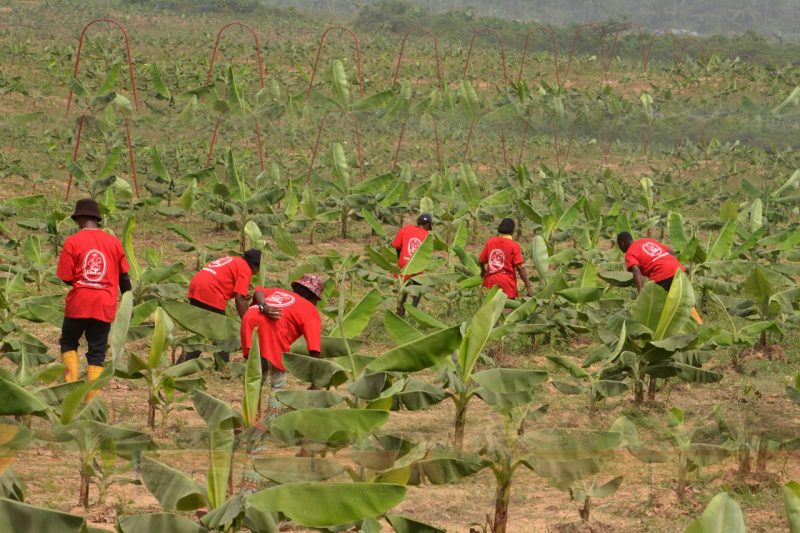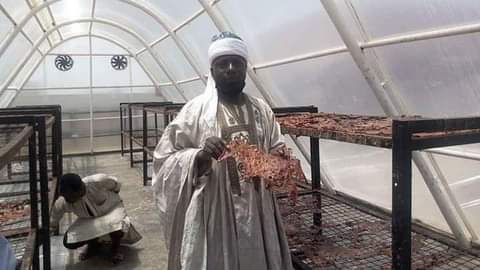As soon as it became clear to Cross River State in 2012 that the Supreme Court judgment on the disputed 76 oil wells was in favour of neighbouring Akwa Ibom State, the government of then governor, Senator Liyel Imoke, looked towards the alternative of agriculture as an assured way to generate much needed revenue.
In 2015 when he took over from Imoke, Governor Ben Ayade was poised to consolidate on agriculture, and make it much more attractive to today’s generation by employing all modern methodologies and enticements to ensure that it can be taken proudly as a profitable profession and venture.
There are three major areas in agriculture which Ayade has vowed to use as huge money spinners. These are rice, to the extent that he has even created a section out of his Ayade Industrial Park and christened Rice City. The other two are banana and cocoa.
Cocoa
Realising that the state is acknowledged as the number two producer of cocoa, which is vastly found in the central part of the state, including Etumg, Boki, Ikom, and Akamkpa LGAs, the governor set about revolutionising the cocoa sector. He appointed Mr Oscar Ofuka as his special adviser to lead the cocoa revolution.
Ayade has established the Ikom Cocoa Processing Plant as he promised. The plant, when commissioned, will serve as a one-stop centre where the natural resource will be processed from its raw state into beverage form instead of being exported through many ports to foreign countries before it is then processed, packaged and sent back to the country as chocolate, drinks etc, and sold at exorbitant rates.
The major ultramodern Cocoa Processing Plant is situated on a 50 hectares land. When completed, the plant will have staff quarters, health centre, canteen, security posts, and other facilities. The ground-breaking of the plant took place last October. The site engineer, Martins Abimbola, assured that his company will meet the completion deadline.
The Special Adviser to the Governor on Cocoa, Oscar Ofuka, who was at the factory, said Ikom had been producing cocoa for over 60 years without any processing plant, adding that it took political will to establish the facility.
According to Ofuka, farmers have been challenged to provide 300,000 hectares of land for the cultivation of organic cocoa to feed the plant.
“There will be job opportunities as 3,000 youths will be employed. It will create wealth as the state’s GDP will go up,” he said.
Charles Ofulue, Director, Ministry of Agriculture, said the plant will produce between 30,000 and 40,000 metric tons of processed cocoa annually, recalling that Governor Ayade had expressed the need to establish the plant in Ikom to add value to cocoa produced in the area and to create jobs.
The president, Cocoa Producers Association of Nigeria and vice president, World Cocoa Producers Organisation, Sayina Ariman, who was at the plant with journalists said, “The plant is the first ever cocoa processing facility in this part of the country. The world is interested in this cocoa plant. This plant will add value to what is being produced here.
“We had 27 cocoa processing factories in the country in the 80s. Only four are remaining. Cocoa is still the highest foreign exchange earner, after oil.”
Recently, Ayade said his aim from the practical emphasis he was placing on cocoa was so for the state to become number one producer in the country as well as make it a goldmine. For this reason, he inaugurated the transplanting of organic cocoa in 3,800 hectares of land in Akamkpa Local Government Area of the state.
Banana plantation
All over the country, Cross River may be arguably one state where emphasis is placed much on cultivating banana in large, commercial quantity for export.
Professor Eneji, the state agric commissioner, disclosed that the state government had earmarked about N1 billion to procure lands, cultivate them and harvest new species of banana for local and foreign consumption.
Already, they have acquired over 5000 hectares of land in Odukpani and Boki LGAs of the state. “The banana plantation in Odukpani is almost ready for harvest,” he told journalists recently. He said when harvesting begins, it would be a source of foreign exchange for the state.
The commissioner said the banana is a foreign specie whose suckers are imported, adding that it is the type consumed in Europe and “When it is available in Cross River, countries in Europe would prefer to import from here at a cheaper cost than from South America where they currently import the commodity.”
Eneji also disclosed that 16,000 farmers in the state had been trained under the Central Bank’s Anchor Borrower’s programme.
Rice
Going by his daily visits to what he constantly refers to as Rice City located at the newly created sprawling Ayade Industrial City where many other factories are springing up, it would be right to conclude that the governor’s biggest dream is to realise cultivation and production of rice in commercial quantity in the state.
The rice plant is fitted with modern seedlings laboratory. He would not reveal how much it has taken him to establish such a gigantic factory which idea he got from a country in Asia. He has gotten Chinese experts to install the machines, man and manage the research and complex process of the automated rice multiplication project. It certainly could be the first of such factory in West Africa, according to him.
When he conducted a test run of the factory as part of his third year in office celebration, Ayade said the specie of rice which the factory will produce will be called ‘Cala 77’. He said with the Federal Government’s patronage, the rice city will generate over N70 billion per annum thereby impacting state and national economies.
There is also the Yala/Ogoja Rice Processing Facilities project which began last year. It is more than 50% completed, said the site engineer, Imaga Okone when reporters visited.
He said the mill will produce five tons of rice per hour when it commences production.
Okone said the rice revolution in Cross River will end the diversion of rice from the state to Ebonyi and Abia where it is rebranded, adding that the mill will work in conjunction with the Rice City in Calabar where seedlings will be produced.
The commissioner for Information and Orientation, Mrs. Rosemary Archibong, said premium grains would be produced at the mill, while broken grains would be converted to energy.
“It will be a mill with a difference. It is a mega feat by our government. We are adding value to rice production. Everybody will benefit from the rice value chain,” she said.
Oil palm
Worthy of mention, too, is the seriousness put into revitalising the oil palm sector. There are many state-owned oil palm plantations in the state. Imoke’s government had sold off the former Ibiae/Calaro oil palm estate to Wilmer PZ International which it also bought alongside the former Obasanjo farms.
The commissioner for agriculture, Prof Eneji had said: “We are also looking around for a serious investor for the Boki Oil Palm estate. The investor will carry out a total overhaul because the trees are old. Wilmer is doing well with the Calaro Oil Palm Estate,” he said.
The commissioner also said “All policies of the government revolve around empowering small scale farmers in the state.”
He said the Songhai project brought to the state by former Governor Liyel Imoke, was not dead or abandoned, adding that “facilities there are used in training farmers that state will empower.”
He said 150,000 palm seedlings have been produced in Ogoja at a cost of N2,800 each but sold to farmers at a subsidized cost of N200 per seedling.
He said 70,000 nurseries have been sold to farmers out of the 150,000 produced, adding that apart from Ogoja, palm seedlings are also produced at Atimaka in Ikom and Nsan in Akamkpa. The seedlings were from the National Institute for Oil Palm Research (NIFOR).





Leave A Comment